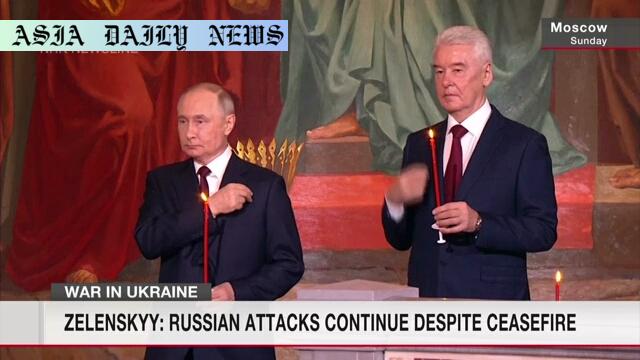Ceasefire: Zelenskyy claims Russian attacks persist despite Putin’s truce during Easter, urging extended peace negotiations.
Ceasefire declared by Putin during Easter met with skepticism.
Zelenskyy reports ongoing Russian attacks, raising concerns.
Ukrainians celebrate Easter amidst a tense ceasefire situation.
Citizens express doubts on the truce’s authenticity.

Ceasefire Declared by Putin Amid Ongoing Tensions
Russian President Vladimir Putin’s declaration of a 30-hour unilateral ceasefire during the Easter celebrations has been met with skepticism from Ukrainian officials and civilians alike. Announced from Saturday at 6 p.m. until the end of Sunday, Moscow time, this truce was ostensibly aimed at halting hostilities and honoring a sacred holiday. However, reports emerging from Ukraine, including statements by President Volodymyr Zelenskyy, reveal a different reality. Instead of pausing aggression, isolated attacks have continued, particularly in the eastern regions of Ukraine, casting serious doubts on Russia’s commitment to peace.
Zelenskyy pointed out that Russian forces have orchestrated minor advancements and inflicted losses during the truce period. Assaults and shelling in areas like Donetsk indicate that the ceasefire is more of a pretense, aiming to project an image of diplomacy to the international stage. The Ukrainian leader also expressed an earnest appeal to Russia, requesting an extension of the ceasefire for 30 days beyond Easter, showcasing Ukraine’s willingness to pursue a genuine path toward de-escalation.
Public Skepticism Regarding Russia’s Intentions
Ukrainian civilians have voiced immense distrust toward the ceasefire. Many perceive it as a political maneuver rather than a genuine effort to halt violence. A 34-year-old Ukrainian man called the ceasefire “a mere gesture for Russian optics” while citizens in Kyiv’s central monastery celebrated Easter, seemingly wary of the looming threat of violence. Their symbolic acts of optimism included the traditional blessing of decorated eggs and pastries but were shadowed by reports of aggression.
One poignant account came from a 38-year-old woman who reported seeing a drone shot down near her residence on the same day the ceasefire began. Fear and skepticism prevailed as she described the event as evidence that Russia seeks to exploit such truces to gain leverage in future negotiations. Similarly, another resident labeled Russia a “terrorist state,” emphasizing Ukrainians’ grievances and mistrust. With ongoing violence and deep-rooted fears, citizens are left navigating an uncertain reality, hoping for genuine opportunities for peace.
Zelenskyy’s Bold Appeal to Extend the Ceasefire
In his steadfast commitment to protecting his people, Zelenskyy has proposed extending the Easter ceasefire for 30 more days. This initiative, if accepted, could potentially provide a window for vital humanitarian aid and diplomatic engagement. Unfortunately, Russia’s apparent breach of its own ceasefire declaration casts doubt on such progress. Ukrainian officials believe that continuous aggression may undermine long-term peace prospects and escalate conflict scenarios further.
From Kyiv to the Donetsk region, Zelenskyy’s leadership has demonstrated resilience. By urging extended peace talks, he sends a message to the international community: Ukraine remains open to dialogue but refuses to ignore acts of aggression disguised as strategic ceasefires. Acknowledging these nuanced dynamics is crucial, as geopolitical tensions escalate and individual lives and communities bear the brunt of political posturing.
Human Resilience Amid an Uncertain Future
Despite the discord clouding Easter celebrations, Ukrainian society continues to show tremendous resilience. Under circumstances marked by mistrust and enduring conflict, citizens gather in places of worship, clinging to traditions that bring comfort and a sense of normalcy. A unified desire to build a better future for children emerged as a key theme from interviews with local residents. Communities stand resolute, clinging to hope amidst adversity and navigating daily life with remarkable courage.
These personal stories underscore a broader narrative: that of a nation under siege, striving to preserve its identity, values, and way of life against overwhelming odds. Regardless of the skepticism surrounding Russia’s ceasefire intentions, Ukrainians remain grounded in their faith and longing for lasting peace. The road ahead may be riddled with obstacles, but the unwavering spirit of Ukraine provides a powerful counterbalance to the challenges of war.
Commentary
Skepticism Surrounding Russia’s Ceasefire Declaration
The Easter ceasefire declared by Russian President Vladimir Putin offers much to unpack from both a geopolitical and humanitarian perspective. While such declarations of peace are typically welcomed, their execution and sincerity often dictate their true impact. The ongoing reports of isolated aggression only serve to deepen existing skepticism, especially among those who have witnessed firsthand the devastation of the ongoing conflict. Zelenskyy’s cautionary tone is, therefore, justified, as actions must align with words for trust to be built.
The Human Cost of Symbolic Gestures
What perhaps makes this ceasefire controversial is the underlying perception that it serves more as a political tool than a genuine attempt to encourage peace. Through this lens, Russia’s decision seems performative—an effort to convert global and domestic perceptions without addressing the realities on the ground. Though brief truces could serve purposes like facilitating humanitarian access, their effectiveness is severely limited when violations are reported concurrently.
A Glimpse into Ukraine’s Hope and Resilience
Against the backdrop of mistrust and conflict, what stands out is the extraordinary resolve of Ukrainian citizens. Their commitment to maintaining cultural traditions and their openness to dialogue for an extended ceasefire symbolize an enduring hope. However, one cannot overlook the lingering uncertainty and pain inflicted by ongoing aggression. The international community must thus engage in holding aggressors accountable, to ensure such ceasefires are more than symbolic acts.
While the war seems far from over, the aspiration for peace persists among Ukrainians and their leadership. This shared vision, coupled with diplomatic persistence, could pave the way toward meaningful resolutions. The global community’s continued support is equally vital to reevaluate efforts and diplomatic strategies aimed at ending this prolonged conflict. Ultimately, the human spirit’s resilience shines brightly even amidst the darkest of times, offering a silver lining for a better future.


